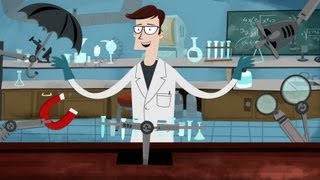(单词翻译:单击)
Why does salt dissolve in water but oil doesn't?
为什么盐可溶于水而油却不行呢?
Well, in a word, chemistry, but that's not very satisfying, is it?
嗯,从一种角度来说,是化学作用,但是这并不很令人信服,不是吗?
Well, the reason salt dissolves and oil does not comes down to the two big reasons why anything happens at all: energetics and entropy.
其实,盐可溶于水而油不能的原因,可归结为一切事物与现象发生的两个根本原因:力能学和熵。
Energetics deals primarily with the attractive forces between things.
力能学主要讨论物体之间的引力。
When we look at oil or salt in water,
当我们观察水中的盐或油时,
we focus on the forces between particles on a very, very, very small scale, the molecular level.
我们会在一个非常微小的尺度内关注粒子之间的作用力,分子层级。
To give you a sense of this scale, in one glass of water, there are more molecules than known stars in the universe.
这个尺度究竟有多微小呢?在一杯水里,分子的数量比宇宙中已知的星星数量还要大。
Now, all of these molecules are in constant motion, moving, vibrating, and rotating.
现在,所有这些分子都在做匀速运动,移动、振动并且旋转。
What prevents almost all of those molecules from just flying out of the glass are the attractive interactions between molecules.
阻止了几乎所有的这些分子从杯子里面飞出去的是分子之间相吸引的相互作用力。
The strength of the interactions between water, itself, and other substances is what we mean when we say energetics.
在水与它自己之间,以及与其他物质之间相互作用力的力度,就是我们所说的力能学的含义。
You can think of the water molecules engaging in a constant dance,
你可以想象水分子在始终如一地舞蹈着,
sort of like a square dance where they constantly and randomly exchange partners.
有点像那种经常且随机更换舞伴的方块舞。
Put simply, the ability for substances to interact with water, balanced with how they disrupt how water interacts with itself,
简言之,物质与水之间,那种平衡于它们破坏水分子之间的相互作用的程度的相互作用的能力,
plays an important role in explaining why certain things mix well into water and others don't.
在解释为什么有些物质可溶于水,而另一些却不能时扮演着重要的角色。
Entropy basically describes the way things and energy can be arranged based on random motion.
熵基本描述了建立在无规则运动基础上的物质与能量被组合的方式。
For example, think of the air in a room.
例如,想象一个房间里的空气。
Imagine all the different possible arrangements in space for the trillions of particles that make up the air.
想象一个空间里万亿个组成空气的分子所有可能的组合方式。
Some of those arrangments might have all the oxygen molecules over here and all the nitrogen molecules over there, separated.
其中一些组合方式可能会将所有的氧分子置放在这一边,而将所有氮分子置放在那一边,使二者分离开来。
But far more of the possible arrangements have those molecules mixed up with one another.
然而,更多可能的方式是使这些分子彼此混合起来。
So, entropy favors mixing. Energetics deals with attractive forces.
因此,熵倾向于讨论“混合”。力能学则讨论引力。
And so, if attractive forces are present, the probability of some arrangements can be enhanced,
故而,如果引力存在,一部分组合方式的可能性便会被提高,
the ones where things are attracted to each other.
也就是那些物体彼此吸引的方式。
So, it is always the balance of these two things that determines what happens.
所以,决定所发生的现象的通常是这二者的平衡。
On the molecular level, water is comprised of water molecules, made up of two hydrogen atoms and an oxygen atom.
在分子层级上,水是由水分子组成的,水分子由两个氢原子和一个氧原子构成。
As liquid water, these molecules are engaged in a constant and random square dance that is called the hydrogen bonding network.
作为液态水,这些分子从事着恒定而随机的被称为“氢键网络”的“方块舞”。

Entropy favors keeping the square dance going at all times.
熵倾向保持这种“方块舞”一直进行。
There are always more ways that all the water molecules can arrange in a square dance,
所有水分子被组合成“方块舞”的方式通常会更多,
as compared to if the water molecules did a line dance.
如果和水分子被组合成“排舞”的方式比较的话。
So, the square dance constantly goes on. So, what happens when you put salt in the water?
因此,“方块舞”永恒地进行着。那么,当你把盐放进水里时会发生什么呢?
Well, on the molecular level, salt is actually made up of two different ions,
嗯,在分子层级上,盐其实是由两种不同的离子构成的,
chlorine and sodium, that are organized like a brick wall.
氯离子和钠离子,它们就像砖墙一样被组合起来。
They show up to the dance as a big group in formation and sit on the side at first,
它们以编队的形式作为一个大团体出现在舞会上,并首先坐在了一边,
shy and a bit reluctant to break apart into individual ions to join the dance.
害羞,并且有些不情愿去分离成单独的离子来加入这场舞会。
But secretly, those shy dancers just want someone to ask them to join.
但是这些腼腆的舞者暗地里却希望有人让它们加入。
So, when a water randomly bumps into one of them and pulls them into the dance away from their group, they go.
所以,当一个水分子偶然地碰到它们中的一个并且将它们推向舞会、远离它们的团体时,它们就会去。
And once they go into the dance, they don't come back out.
而且,只要它们加入了舞会,就不会再回来了。
And in fact, the addition of the salt ions adds more possible dance positions in the square dance,
事实上,盐的加入使得“方块舞”的组合有了更多可能的形式,
so it is favored for them to stay dancing with water.
所以对它们来说与水共“舞”有好处。
Now, let's take oil.
现在,我们来说说油。
With oil, the molecules are sort of interested in dancing with water, so entropy favors them joining the dance.
油分子对与水共“舞”还是有点感兴趣的,所以熵偏向于让它们加入舞会。
The problem is that oil molecules are wearing gigantic ballgowns, and they're way bigger than water molecules.
而问题在于油分子都穿着巨大的长礼服,而且它们比水分子大得多。
So, when an oil molecule gets pulled in, their size is really disruptive to the dance
所以,当一个油分子加入舞会时,它的身量简直对舞会具有破坏性,
and the random exchange of partners that the waters engage in, a very important part of the dance.
而且,水所从事的随机更换舞伴的行为,是舞会的一个重要部分。
In addition, they are not great dancers.
此外,它们也不是杰出的舞者。
The water molecules try to engage the oil molecules in the dance,
水分子试图让油分子参与到舞会当中来,
but they just keep bumping into their dresses and taking up all the room on the dance floor.
但是它们总是碰到它们的礼服并且占掉了舞池里所有的空间。
There are way more ways the waters can dance when the oil gets off the floor,
当油离开舞池时,水跳舞的方式就多了许多,
so the waters squeeze out the oil, pushing it back to the bench with the others.
所以水把油挤了出去,把它推回了其他油分子一起坐着的长凳子上。
Pretty soon, when a large number of oils have been squeezed over to the side,
不一会儿,当一大群油分子都被挤到一边时,
they band together to commiserate about how unfair the waters are being and stick together as a group.
它们就会聚到一起,并且遗憾地叹息水是多么的不公平,然后粘在一起成为一个团体。
So, it is this combination of the interactions between molecules and the configurations available to them
因此,分子之间的相互作用的结合以及对它们来说可能实现的构造,
when they're moving randomly that dictates whether they mix.
就在无规则运动时,决定了它们是否能够混合。
In other words, water and oil don't mix because they just don't make great dance partners.
换一句话说,油和水不能混合的原因就是因为它们组不成完美的舞伴。


